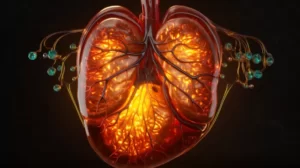How quickly do you walk? You may be surprised to learn that your walking speed might predict how long you’ll live. A slower gait could correlate with a shorter lifespan. One health concern you might not have thought about that’s associated with this is cadmium exposure. Recent research found an association between cadmium levels in blood and urine and walking speed, which is a measure of mobility and physical performance.
The dangers of cadmium
Cadmium, a soft, silver-white metal, is typically found with zinc, lead, and copper ores. Its salts can dissolve in water, making it possible for cadmium to enter the environment and food supply. A growing amount of evidence suggests that even low cadmium exposure can be toxic. This heavy metal is linked to slower walking speeds, hypertension, and increased markers of inflammation associated with cardiovascular disease.
How you’re exposed to cadmium
Cadmium exposure can occur in several ways:
- Smoking and passive cigarette smoke: Tobacco plants absorb cadmium from the environment, making cigarette smoke a primary route of exposure. In fact, smokers have roughly double the cadmium body burden compared to non-smokers.
- Workplace exposure: If you work with cadmium-containing ores or products containing cadmium, like paints, batteries, and plastics, you might be exposed to the heavy metal. Additionally, jobs involving plating, soldering, and welding can lead to cadmium exposure.
- Environmental exposure: Cadmium can enter the environment through metal mining and refining, phosphate fertilizer production and application, fossil fuel combustion, waste incineration, and disposal. It can also bind strongly to organic matter and be taken up by plants, eventually entering the food supply.
- Our food supply: For most people, exposure to cadmium occurs when eating food grown in soils with high cadmium levels, such as leafy vegetables, potatoes, grains, peanuts, soybeans, and sunflower seeds. Fish and shellfish can also contain significant amounts of cadmium. If your diet lacks sufficient nutrients, you may absorb more cadmium from your food.
Health impacts of low-level cadmium exposure
In the body, most of the cadmium accumulates in the kidneys and liver, where it can remain for years. A small portion leaves the body in urine and feces. While your body can change some cadmium into a harmless form, too much cadmium can damage the liver and kidneys.
Long-term, low-level cadmium exposure can cause bones to become fragile and break more easily. Additionally, anemia, liver disease, and nerve or brain damage have been observed in animals exposed to cadmium. Research has recognized cadmium as a human carcinogen.
Reducing your exposure to cadmium
If you suspect current or ongoing cadmium exposure, you can go for blood or urine tests, which are very accurate. Hair and nail tests can also measure exposure, though these are more susceptible to external contamination. Regardless of your test results, it’s essential to minimize your exposure to cadmium by:
- Avoiding smoking and passive cigarette smoke
- Wearing protective equipment at work and bathing and changing clothes before going home if you’re exposed to cadmium at work
- Checking local fish advisories before consuming fish or shellfish
- Disposing of nickel cadmium batteries correctly by recycling them in appropriate facilities
- Taking paints to your local recycling or waste disposal site
Protecting yourself from cadmium exposure
Detoxification is vital for preventing the negative impacts of cadmium exposure. In addition to dietary choices that promote the body’s natural detoxification system, supplementation can help bind and remove heavy metals like cadmium from the body. Natural fibers, particularly polysaccharides like pectins, and alginates from seaweed, are known for binding to heavy metals and toxins and removing them from the body. A combination of modified citrus pectin and sodium alginates can significantly aid in detoxifying your body from cadmium and other heavy metals.
To stay healthy, maintain good hydration, eat well, exercise, minimize exposure to toxins, and take supplements to support toxin removal. Simple solutions can have a significant impact on your health in our complex world.



![8 Simple Rules to Refresh Your Body with a Healthy Cleanse [See Pictures]](https://naturalhealthreserve.com/wp-content/uploads/2024/01/8-rules-healthy-cleanse-slideshow-300x168.webp)